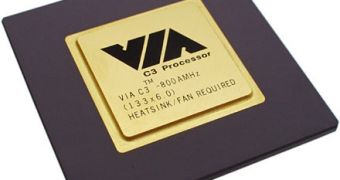Chip manufacturer VIA has finally started shipping sampling units of its x86 Isaiah processor announced earlier this year. The Isaiah architecture will replace the company's C7 chip, that has gained huge popularity on the cheap Linux-based ultra-mobile PC market.
According to Glenn Henry, CEO of Centaur Technology (VIA's processor branch), the company has started "aggressively" shipping sampling units of its newest processor offering.
While delivering improved performance over the C7 series, the first generation of Isaiah processors will maintain their pin-to-pin compatibility with the latter. This means that any C7 user could swap the chip with an Isaiah unit without replacing the motherboard or performing additional hardware tweaks.
Henry also claims that the Isaiah offering is especially tailored to match the needs of low-cost "thin-and-light notebook" market. However, the competition is expected to be harsh, as Intel's upcoming Atom processor will also pitch at the NetBooks market, as Intel likes to call it.
The chip manufacturer revealed that the Isaiah chip will take up 3.5 watts while operating at full load. In contrast, Intel's upcoming Atom "Silverthorne" will require between 0.6 watts while idle and 2.5 watts while running at full capacity. However, Intel managed to cut down on power requirements by adopting the "in-order" execution technology, which has a negative impact over the chip's performance. Instead, VIA chose to adopt a superscalar, out-of-order design, that can process three instruction per clock.
Despite the fact that VIA's processor might deliver improved performance over Intel's counterpart, its success on the market is still questionable. While VIA has limited resources and lower media exposure, Intel could aggressively promote the Atom chip. However, Henry relies on VIA's long tradition on the low-cost, low-performance computer market, an area where Intel is just starting to emerge.

 14 DAY TRIAL //
14 DAY TRIAL //